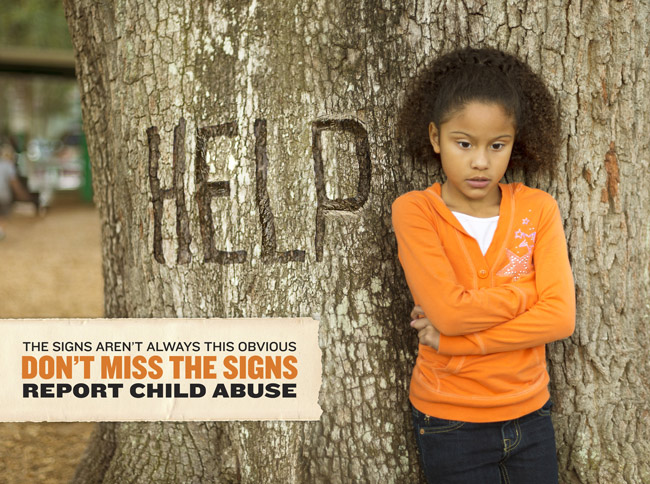
“Don’t Miss the Signs” – that’s the message Floridians will soon see on television ads, posters and other materials, urging them to raise their voices to stop child abuse.
The comprehensive public awareness campaign will educate Floridians about their obligation to report suspected abuse under Florida’s sweeping new child abuse reporting law, which took effect Oct. 1, 2012.
Last year, the Florida Legislature passed the nation’s most protective child abuse reporting law, making it clear that reporting suspected child abuse is everyone’s responsibility, not just designated “professional reporters” such as medical professionals and teachers. The law also clarifies that the state’s abuse hotline will accept reports of abuse committed by people other than parents and primary caregivers, such as a coach, teacher or neighbor, raising questions of privacy–or social vigilantism–that will contend with the law’s protective intentions.
“Florida has set a national standard for child protection through the strength of our laws,” said DCF Secretary David Wilkins. “But our laws are only effective if our citizens are willing to do their part and report abuse if they suspect a child is at risk.”
To support the new law’s implementation, the Legislature funded a comprehensive effort to raise awareness, encourage reporting and promote prevention. DCF developed the new “Don’t Miss the Signs” campaign in partnership with the Lauren’s Kids foundation, which seeks to end childhood sexual abuse.
To drive home the message that all citizens have a responsibility to report abuse, the public is encouraged to sign an online petition (“I commit my eyes, my voice to protect our children”) on the website DontMissTheSigns.org. The site also provides educational materials about child abuse prevention and Florida’s abuse reporting law, linking to DCF’s abuse reporting system.
“I challenge every Floridian to sign this petition and actively join the effort to keep the children around them safe,” said Lauren Book, president and CEO of the Lauren’s Kids foundation. “It will take all of us, working together, to end child abuse.”
Book created her foundation to end childhood sexual abuse through education and awareness. Book herself was a victim of sexual abuse by her family’s nanny from the ages of 11 to 17. Elements of the new awareness campaign will focus specifically on preventing childhood sexual abuse by educating children, parents and youth-serving organizations.
Last year, the Legislature funded and Book created a curriculum intended to prevent childhood sexual abuse. The curriculum, Safer, Smarter Kids, was distributed to every public kindergarten in Florida and early testing showed a 77 percent gain in personal safety knowledge by children who completed the curriculum.
The Don’t Miss the Signs educational campaign and outreach effort includes a diverse array of components, including:
· A series of television and radio public service announcements, which begin airing this month. The spots feature children holding or wearing signs of abuse or the word, “Help,” along with the message, “The signs of child abuse aren’t always this obvious. Don’t miss the signs. Report child abuse.” Another spot, promoting the online petition, features a diverse series of Floridians – such as a school crossing guard, a woman at a cash register, a coach – each delivering a line of the pledge.
· Printed materials, including posters, brochures and rack cards that list possible signs of abuse in children of different ages, i.e. dullness, inactivity and excessive passivity in an infant; a return to bedwetting in an older child; self-mutilation in a teen.
· Recommended protective protocols and training materials for youth-serving organizations to help prevent childhood sexual abuse.
· Educational materials to help foster parents assimilate children who have been sexually abused into their families.
· And materials with protective strategies for parents and caregivers of children with disabilities, who are often targets of sexual abuse.
· A 30-minute television special about childhood sexual abuse and ways to prevent it.





























Leave a Reply